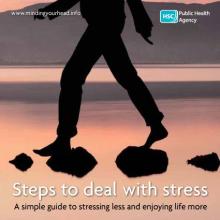Stress
Stress is the feeling of being under too much mental or emotional pressure. Help and support is available to help manage stress.
What is stress?
Stress is the feeling of being under too much mental or emotional pressure. Pressure turns into stress when you feel unable to cope. People have different ways of reacting to stress, so a situation that feels stressful to one person may be motivating to someone else.
Many things in life can cause stress, including work, relationships, money issues and much more. When you feel stressed, it can get in the way of being able to deal with the things that are causing you stress. It can also affect other things you do in your daily life.
Signs of stress
Stress causes an increase in hormones in your body which can help deal with pressures or threats. This is known as the ‘fight or flight’ response. Once the pressure or threat has passed, stress hormones will usually return to normal.
If you’re constantly under stress, these hormones will stay in your body, which can lead to physical and psychological symptoms of stress such as:
- tiredness;
- headaches and/or muscle tension;
- feeling irritable or short tempered;
- sleeping problems;
- loss of appetite;
- difficulty concentrating and/or racing thoughts;
- feeling anxious, nervous or afraid;
- low self-esteem;
- unable to enjoy things;
- drinking more alcohol or using drugs;
- eating more or less;
- issues with the digestive system;
- sexual problems;
- changes to menstrual cycle.
Things that might help you manage stress
If you are experiencing stress, there are things that you can do to help you manage how you are feeling.
Talk to someone
Talking to a friend, family member or colleague about how you’re feeling can help you see things differently.
Identify triggers and make a plan
- Write down all the things going on in your life at the moment, such as paying bills, an issue with your health, a life event, work or caring responsibilities, or how you’re feeling about your life.
- Organise your time and make a plan of when you can do things. This will help you feel more in control and identify things that can wait.
- Take steps to address some of the causes of your stress. This could be making a plan for yourself or talking to a person or service that can support you.
Try breathing exercises
Gently breathe in through your nose and out through your mouth, keeping the pace slow and regular. Then, starting at your toes and working up to your head, slowly tense and then relax all the muscles in your body. Keep doing this for around five minutes.
Build the Take 5 steps to wellbeing into your daily routine
- Connect
- Learn
- Be active
- Take notice
- Give
Accept the things you can’t change
It’s not always easy, but accepting there are some things happening to you or in the world around you that you cannot change can help you gain a different outlook and feel better.
Be kinder to yourself
- Recognise your achievements, big and small, and do something to celebrate them.
- Do something different for yourself. You could walk a new route, take a day trip or try a new activity or hobby.
- Resolve conflicts. If possible speak to those you are having relationship difficulties with, whether at home, work or among friends.
- Forgive yourself quickly when you don’t meet a goal or make a mistake. We can’t change the past.
Join a stress control class
Find out more about stress control classes and sign up to join the next set of classes online.
Resources for dealing with stress

Steps to deal with stress - A simple guide to stressing less and enjoying life …
The Steps to deal with stress booklet provides tips and practical advice on coping with stress in your life and covers recognising stress, getting ready, coping better, learning from bad experiences and taking action now.






